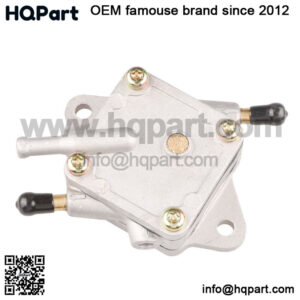How Fuel Pumps Work
Most fuel pumps are vacuum powered. A vacuum fuel pump has three chambers: an inlet, an outlet, and a pulse, with a diaphragm between each chamber. An airline runs from the crankcase of the engine to the fuel pump into the pulse chamber.
As the pistons in the engine fire, they create pressure changes in the pump. The diaphragm pulses back and forth, pumping fuel into your engine. Any kind of debris can interfere with the diaphragm’s pulse, and it will keep your golf cart fuel pump from pushing gasoline to the engine at peak efficiency.
Fuel Pump Problems
What happens when a fuel pump gets clogged? The simple answer is the engine doesn’t run as well as it should. More specifically, you may have trouble with your engine at low speeds, or it may lose power at high speeds. If your clog is especially bad, the engine sputters to a halt or may not even start.
Fuel Breaks Down
So, what causes a clogged fuel pump? Sometimes fuel breaks down during long-term storage. Gasoline is a complex blend of compounds that are inherently volatile. As the gas sits in storage, some of it will evaporate, and it will lose some of its explosive power.
Oxidation is a much bigger problem. When your golf cart sits for a long time, oxygen will slowly creep into your fuel systems. When oxygen reacts with gasoline, it causes gum and varnish deposits which look like a brown gel in your fuel pump.
To properly store your fuel, you must drain it from all the fuel systems that aren’t designed to store gasoline. Unhook your gas lines, drain the fuel pump, and empty the carburetor before long-term storage. Make sure to use an approved gasoline storage container.
Ethanol Mix
Most gas stations sell gasoline mixed with a small percentage of ethanol, designed for automobiles. Normally, a 10% ethanol mix just causes a minor power loss, but long-term storage creates big problems. Ethanol is hydrophilic, which means that it attracts water. Water and fire do not mix well, so it is a big problem for your golf cart’s internal combustion engine.
As the ethanol in your gas tank attracts water over long storage, it can cause rust deposits in the fuel supply. When you start up your golf cart, the rust deposits will come rushing through the fuel system into the pump.
There are two easy ways to prevent ethanol from damaging your fuel systems. You can buy gasoline without ethanol. Marinas, and some home centers, sell gasoline without ethanol. It will cost you a little extra, but it’s less than the cost of new parts.
If you can’t find a store that sells gasoline without ethanol, you can use gas from a gas station. Just burn through it before the ethanol has a chance to attract enough water to cause a problem—usually within three months.
If you want to be more cautious, you can add a fuel stabilizer to keep your golf cart engine running smoothly. Make sure you run your engine dry before storing it at the end of the season.
External Dust and Debris
If you, like most people, use your golf cart for something other than driving around the green pastures at your local country club, your cart will stir up a lot of dust and debris. If you ride frequently through dusty fields or on dirt roads, you know you will find all that grit all over your golf cart. It can be a huge pain to clean up.
Any dust or dirt that travels into your fuel system will get caught in your fuel pump or fuel filter. Over time, your pump will become more inefficient. To keep dust from clogging up your system, check your fuel filters regularly. If they look dirty or clogged, clean them out.
“Keyword”
“how does a yamaha golf cart fuel pump work”
“how does a fuel pump work on a club car golf cart”
“how does a club car fuel pump work”
“how does a fuel pump work at a gas station”
“how does ezgo fuel pump work”
“golf cart fuel pump near me”

